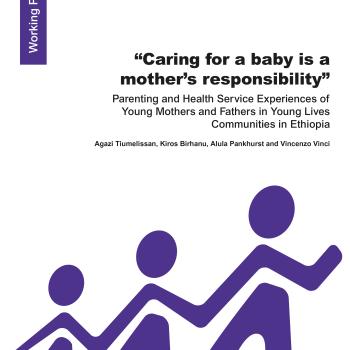
This working paper draws on data from Young Lives and focuses on 29 young families. The paper addresses two main issues: the roles of the young mothers and fathers in parenting, and the health services available to them.
The findings suggest that parenting is almost exclusively the role of young mothers, in addition to other domestic work, helping husbands with agricultural work, and, for some, engaging in income-generating work outside the home. Because of patriarchal norms, this division of labour is accepted by almost all. The role of fathers seems to be limited mainly to income provision, and they were not expected to be actively involved in childrearing, apart from playing with their children in their spare time. There were some exceptionally supportive fathers who helped their wives even with what is culturally considered to be women’s domestic work. However, there were also others who were unsupportive or who spent the money they made on alcohol and were not providing for their family as expected. The role of the extended family was found to be of paramount importance, especially for first- time mothers. This was especially true of grandmothers and sisters- in-law, and to some extent grandfathers. Neighbours also played a key role, but their involvement was found to be diminishing in some cases.
Access to health services has improved as a result of the expansion of the health extension service and its staff, for which the young people in the study were mostly grateful. Community-based health insurance, involving small annual contributions that enable access to services, was also appreciated by most. However, young people expressed concern that the insurance did not cover all essential medication, requiring them to pay additional costs they could not afford.

This working paper draws on data from Young Lives and focuses on 29 young families. The paper addresses two main issues: the roles of the young mothers and fathers in parenting, and the health services available to them.
The findings suggest that parenting is almost exclusively the role of young mothers, in addition to other domestic work, helping husbands with agricultural work, and, for some, engaging in income-generating work outside the home. Because of patriarchal norms, this division of labour is accepted by almost all. The role of fathers seems to be limited mainly to income provision, and they were not expected to be actively involved in childrearing, apart from playing with their children in their spare time. There were some exceptionally supportive fathers who helped their wives even with what is culturally considered to be women’s domestic work. However, there were also others who were unsupportive or who spent the money they made on alcohol and were not providing for their family as expected. The role of the extended family was found to be of paramount importance, especially for first- time mothers. This was especially true of grandmothers and sisters- in-law, and to some extent grandfathers. Neighbours also played a key role, but their involvement was found to be diminishing in some cases.
Access to health services has improved as a result of the expansion of the health extension service and its staff, for which the young people in the study were mostly grateful. Community-based health insurance, involving small annual contributions that enable access to services, was also appreciated by most. However, young people expressed concern that the insurance did not cover all essential medication, requiring them to pay additional costs they could not afford.

